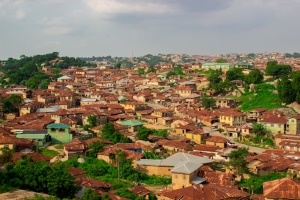Countering Growing Violent Extremism in West Africa

Speaker: Dr. Daniel Eizenga (Africa Center for Strategic Studies)
Date: 19 December 2024
Speaker Session Summary
SMA hosted a speaker session with Dr. Daniel Eizenga (Africa Center for Strategic Studies) as part of its SMA AFRICOM Speaker Series.
Violence perpetrated by extremist groups in the Sahel has increased during the last several years alongside a rise in the number and frequency of military coups. Recent coups include those in Mali (2020, 2021), Burkina Faso (2022), and Niger (2023), all of which overthrew democratically elected governments and installed military juntas. With each successive coup, security in these countries has deteriorated. Dr. Eizenga emphasized that the governments of Sahel nations must play a crucial role in fostering stronger community ties and increasing local commitment to regional security. Mali, Burkina Faso, and Niger have become hotspots for violent extremist-related displacement, among the largest in the world. Many communities have been forced from their homes, and access to humanitarian aid has been severely restricted due to the prevalence of violent extremist organizations (VEOs) and their activities.
A significant driver of radicalization in the region is the abusive behavior of security forces tasked with protecting civilian populations. In 2024, these forces have killed more civilians than many VEOs. Dr. Eizenga highlighted this troubling trend as one of the most alarming developments in 2024.
Since the juntas took power, Mali has shifted from accepting Western anti-terrorism support to relying on the Russian paramilitary group Africorp, formerly known as Wagner. While Africorp claims to conduct counterterrorism operations, it primarily supports the junta’s regime. Russia has further entrenched its influence by disseminating pro-junta disinformation and receiving mining concessions in return. Dr. Eizenga noted that the likelihood of these juntas restoring civilian leadership is minimal, raising the potential for future civil wars and ongoing insecurity.
Meanwhile, Islamic extremist groups are expanding their recruitment and military operations into coastal West Africa. Despite these threats, some promising state-led initiatives have emerged. Ghana and Côte d’Ivoire, for example, are mobilizing security forces to support infrastructure development and youth education programs. These efforts aim to increase employment opportunities, build trust between communities and security forces, and weaken VEOs’ ability to exploit grievances for recruitment.
To see more of Dr. Eizenga’s research on the security in the Sahel, please read his latest report, entitled “Recalibrating Coastal West Africa’s Response to Violent Extremism.”
Speaker Session Recording
Briefing Materials
Biography: Dr. Daniel Eizenga is a Research Fellow at the Africa Center for Strategic Studies responsible for conducting policy-relevant research advancing understanding of pressing security challenges facing Africa. Dr. Eizenga’s research primarily focuses on countering violent extremism in the Sahel and the intersecting roles of civil-military relations, traditional institutions, and civil society across various regime trajectories of African states. He has published his work on the Sahel in a variety of academic and policy outlets and regularly offers expert interviews to the media. Dr. Eizenga holds a Ph.D. and an M.A. in political science with specializations in African studies from the University of Florida.
Comments